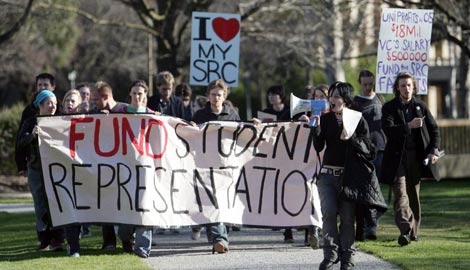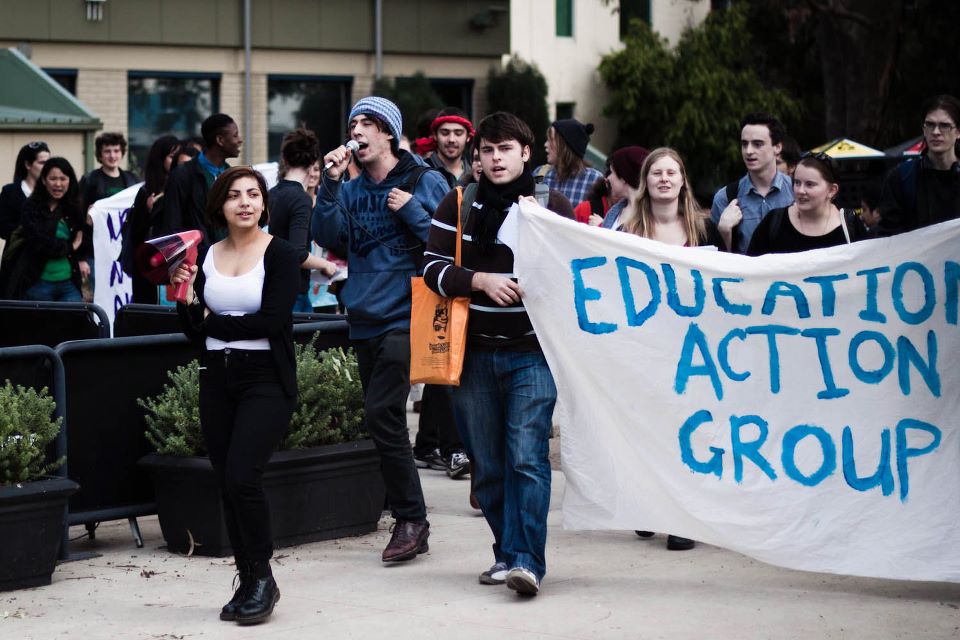Many people attended the national student strike and rally against the federal funding cuts to the tertiary education sector on Tuesday May 14th at the State Library; myself included.
In its aftermath, some of my fellow protestors and I are now wondering why we sometimes feel a creeping doubt about whether our protests can really achieve what we hope they will. Are they not always, already doomed to failure? And where does this doubt come from and can it be dispelled?
Part of the answer may be found in considering similar protests in the recent past, such as the anti-war in Iraq demonstrations of 2003.
In the lead up to the invasion of Iraq, protests against the war were the largest in human history, as measured in the sheer number of people who took to the streets, as well as opinion poll figures. Worldwide, tens of millions of people protested, opposing the US and other governments’ decisions to invade and occupy Iraq.
On Friday February 14 2003, in Melbourne alone, an estimated two-hundred- thousand people marched in the streets to oppose John Howard’s Liberal Government decision to join the US in invading Iraq.
AND YET… Howard was not dissuaded. The Australian military was deployed at the behest of the Bush Administration. The war was waged. Iraq was invaded and occupied and thousands upon thousands of people were killed, maimed and traumatised for life: men, women and children, soldiers and civilians.
So these mass protests failed to stop the war and thus achieve their ostensible aim, but was this their only purpose?
During the height of the anti-war protests, former US President George Bush made the following comment: “You see this is why we need to invade Iraq and bring them our democracy, so that the Iraqi people can also hold such protests when they disagree with their government”.
Rather than dismiss this comment as idiotic, I believe that Bush offers us a valuable insight here into how these protests successfully functioned on a deeper level: their true (unconscious) purpose.
As the philosopher Slavoj Zizek has observed (himself a participant in the anti-war movement), in a strange way the protests satisfied both the protestors and those in power who they were protesting against. That is, the protesters felt good about publicly expressing their opposition to the war, and the politicians felt good about how their democratic society allows for the public right to free speech/criticism of government, etc. Everybody was able to “save face”, maintaining “democratic appearances” despite what was essentially unaccountable, powerful, profiteering elites engineering another catastrophic war.
My concern is that the “self-righteous psychosis” phenomena which characterised opposition to the war in Iraq, could be uncannily similar to what was occurring during the National Student Strike and Rally on May 14th.
Are we not also (unconsciously) maintaining “democratic appearances” and therefore playing into the hands of those we oppose?
Though it was exciting to close down traffic for half an hour, march together in a large crowd and chant our slogans, it seems unlikely that his will stop the cuts any more than the protests managed to stop the war in Iraq. It would seem that our doubts about current methods of protest may have some real justification.
This is a worrying thought, especially when many leading activists and student politicians seem content to repeatedly call everyone to “strike and rally” every time there is a pressing political issue, knowing full well that every time the result is similarly ineffective. Effectively, our current leadership appear to be practicing an insidious cynicism of which we should all be cautious of becoming complicit in.
As I understand it, the cynicism of the student leadership comprises a disbelief in the capacity of ordinary students to understand and care enough about their own plight (and the plight of others) to do something about it. This attitude is encapsulated in a guiding mantra: “Students/people are apathetic.” For student politicians, this attitude manifests in bureaucratic tricks employed to restrict student participation in the decision-making processes of their union such as holding Student Council meetings “in camera” (in secret). For activists, the attitude manifests in their cynical efforts to ‘mobilise’ students to the cause by postering misleading information to trick students into thinking that “classes have been cancelled” thereby fooling them into not attending, and thus unwittingly striking.
Cheap tricks aside, the cynical attitude is most problematically manifest in the executive decision-making processes of our student unions at the campus and national level which purposefully exclude student public participation. “Students are apathetic” provides the rationalisation for making decisions at an elite level, rather than involving the student body in the process. These decisions then (inevitably) result in vain calls to already ineffective action, such as the most recent strike/rally called by the National Union of Students, which further reinforce the notion that yes, students are mostly apathetic, and so the cycle continues…
In summary, the current student leadership seems to have very little faith in the student body to make important decisions about their own plight such as how to respond to federal funding cuts or the hijacking of public universities by unaccountable Administrators and the financial mismanagement this entails.
Just like their idols in the State and Federal parliaments, most student politicians only believe in representational democracy, meaning the people have the opportunity to vote once a year (or three), and in between they have a right to be merely surveyed. And just like their idol(s) in the Russian Revolution, many activists only believe in the revolutionary vanguard to enlighten and lead the currently unconscious masses.
So our protests in their current form may be ineffectual and our leaders infected by cynicism, but are there any alternatives? What is to be done?
I imagine the activist/student politician rebuke: ‘Well that’s all well and good to criticise the strike action and rally we have organised, but what is your positive, constructive, alternative model for organising against defunding, increased prices for less quality courses, staff sackings, etc.? These problems are real and they still require some kind of a solution.’
I believe this is a fair retort, so I will attempt to sketch out a tentative answer.
In the first instance I believe that the best thing we can do in response to anti-social government policy such as the funding cuts is not to immediately (re)act to what we assume is the problem, but rather (re)think the problem. Otherwise we run the risk of wasting our energies reproducing the same kind of ultimately ineffective actions that have marked our movement to date and which seem, in fact, to reinforce existing power structures (from our student union executives to our governments).
It might be helpful to start critically thinking about our predicament and our potential courses of action by considering the example of our brothers and sisters in Quebec and Chile.
The students who play key organising roles in Quebec and Chile do not appear to waste their time staging futile, cynical protest actions that are bound to fail. Instead they build empowering and effective movements, mobilising literally hundreds of thousands of people towards achieving concrete political outcomes and structural change in their societies.
In 2012 the Quebec students defeated a 75% fee-hike policy proposal by forcing a change in their provincial government (roughly the Australian equivalent of Victorian students bringing down the Liberal Napthine State government and replacing it with a Labor government).
From 2010-2012, the Chilean students constituted a similarly effective political force but on an even larger national scale. Their nation-wide protests shut down entire cities and are applied immense pressure on their government to reform the public education system, winning concrete concessions.
Both of these student movement struggles are ongoing, but both have already achieved significant outcomes for the public education system which benefit all members of society.
The question is why are they so effective? What makes them so much more successful than their British, American or Australian counterparts? After all, they too appear to be utilising the tactics of striking and rallying. Is their success simply a product of their political heritage?
The advice of student leaders is pertinent here. Rather than explaining the success of the Quebecois in terms of their ‘Frenchness’ and thus something that we ‘Anglo-saxon’ societies cannot emulate, Gabrielle Nadieu Dubois, spokesperson of the Quebec student union federation called CLASSE, suggests that “The key principle of success in Quebec is exportable, because it’s our mode of organization.” This certainly seems promising.
What Dubois means by ‘mode of organisation’ is empowering people through collective decision-making or what is sometimes called ‘direct democracy.’ In Quebec, all major decisions (such as whether to go on strike) are not made at the executive union level by student politicians and activists. Instead these decisions are made in public decision-making forums or ‘general assemblies’ at the university campus level, or even at the faculty level. Our equivalent public decision-making forum at Monash is called a Student General Meeting (SGM). An SGM constitutes the highest decision-making body for our union and about two weeks ago, the first SGM in 8 years was held at Clayton (as reported by Thomas Whiteside in this edition of Lot’s). 350 Clayton students attended and had the opportunity to vote and decide how we should respond to the recent federal funding cuts among other issues (albeit at a meeting that was administered in an overly bureaucratic and somewhat disorganised fashion!).
Now this model may not be perfect; it may require extensive fine tuning. It may be useful to begin developing SGMs on a Faculty, rather than a campus-wide level. But the principle that such a forum seeks to embody, that of direct- democracy where all students can participate in the decision-making, is vitally important in terms of building an effective student movement which can counter the anti-social policies of State and Federal governments as well as University Administrations.
The only thing that stands in the way of reinvigorating and implementing this organising model in Australia is the prevailing cynicism of the existing student political leadership which has no apparent faith in the capacity, power and passion of the general student public. Of course we should not expect to create a mass movement overnight, it will take many months or even years of building which will certainly involve many failures along the way.
But if we can confront and dispel the cynicism there is hope.
In the immortal words of Samuell Beckett: “Try again. Fail again. Fail better.”


